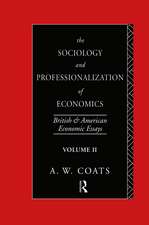Economics, Entrepreneurship and Utopia: The Economics of Jeremy Bentham and Robert Owen: Routledge Studies in the History of Economics
Autor Estrella Trincado, Manuel Santos-Redondoen Limba Engleză Hardback – 10 iul 2017
Owen and Bentham were forerunners of highly relevant current theories of economics – marginalism, entrepreneurship, personnel management, and constructivism. They were acquainted with such important authors as James Mill, Malthus, Ricardo and John Stuart Mill. However, their economic theories were ruled out by classical economists, who actively tried to silence perspectives different from the orthodoxy. This book presents an innovative study of these two social thinkers and reformers, who have rarely, if ever, been studied together. This comparative study provides new context both on the social debate taking place during the Industrial Revolution, and on the development of modern social thought, in particular, the relationship between socialism and utilitarianism.
Economics, Entrepreneurship and Utopia will be of great relevance to scholars with an interest in the history of economic ideas, the history of entrepreneurship, and social reform in both historical and contemporary contexts.
| Toate formatele și edițiile | Preț | Express |
|---|---|---|
| Paperback (1) | 389.38 lei 6-8 săpt. | |
| Taylor & Francis – 12 dec 2019 | 389.38 lei 6-8 săpt. | |
| Hardback (1) | 763.78 lei 6-8 săpt. | |
| Taylor & Francis – 10 iul 2017 | 763.78 lei 6-8 săpt. |
Din seria Routledge Studies in the History of Economics
-
 Preț: 370.72 lei
Preț: 370.72 lei -
 Preț: 302.54 lei
Preț: 302.54 lei - 8%
 Preț: 392.82 lei
Preț: 392.82 lei -
 Preț: 311.28 lei
Preț: 311.28 lei - 9%
 Preț: 1003.10 lei
Preț: 1003.10 lei -
 Preț: 665.68 lei
Preț: 665.68 lei - 9%
 Preț: 935.39 lei
Preț: 935.39 lei -
 Preț: 384.63 lei
Preț: 384.63 lei -
 Preț: 280.74 lei
Preț: 280.74 lei -
 Preț: 326.99 lei
Preț: 326.99 lei -
 Preț: 311.91 lei
Preț: 311.91 lei -
 Preț: 214.15 lei
Preț: 214.15 lei -
 Preț: 310.43 lei
Preț: 310.43 lei -
 Preț: 326.82 lei
Preț: 326.82 lei -
 Preț: 308.97 lei
Preț: 308.97 lei -
 Preț: 324.46 lei
Preț: 324.46 lei -
 Preț: 388.22 lei
Preț: 388.22 lei -
 Preț: 392.71 lei
Preț: 392.71 lei - 26%
 Preț: 850.91 lei
Preț: 850.91 lei - 27%
 Preț: 995.39 lei
Preț: 995.39 lei - 18%
 Preț: 1005.01 lei
Preț: 1005.01 lei - 18%
 Preț: 1002.60 lei
Preț: 1002.60 lei - 26%
 Preț: 1046.46 lei
Preț: 1046.46 lei - 18%
 Preț: 1280.31 lei
Preț: 1280.31 lei - 18%
 Preț: 1055.51 lei
Preț: 1055.51 lei - 18%
 Preț: 1055.51 lei
Preț: 1055.51 lei - 28%
 Preț: 987.72 lei
Preț: 987.72 lei - 25%
 Preț: 824.17 lei
Preț: 824.17 lei - 18%
 Preț: 1061.93 lei
Preț: 1061.93 lei - 18%
 Preț: 716.32 lei
Preț: 716.32 lei - 18%
 Preț: 1006.07 lei
Preț: 1006.07 lei - 18%
 Preț: 1069.92 lei
Preț: 1069.92 lei - 12%
 Preț: 342.67 lei
Preț: 342.67 lei - 26%
 Preț: 991.34 lei
Preț: 991.34 lei - 18%
 Preț: 1056.00 lei
Preț: 1056.00 lei - 18%
 Preț: 1076.53 lei
Preț: 1076.53 lei - 18%
 Preț: 698.08 lei
Preț: 698.08 lei - 22%
 Preț: 332.02 lei
Preț: 332.02 lei - 18%
 Preț: 1169.78 lei
Preț: 1169.78 lei - 18%
 Preț: 1059.84 lei
Preț: 1059.84 lei - 30%
 Preț: 852.88 lei
Preț: 852.88 lei - 25%
 Preț: 830.10 lei
Preț: 830.10 lei - 18%
 Preț: 1125.78 lei
Preț: 1125.78 lei - 18%
 Preț: 1062.98 lei
Preț: 1062.98 lei - 18%
 Preț: 847.96 lei
Preț: 847.96 lei - 18%
 Preț: 953.01 lei
Preț: 953.01 lei - 18%
 Preț: 1168.76 lei
Preț: 1168.76 lei
Preț: 763.78 lei
Preț vechi: 1027.17 lei
-26% Nou
Puncte Express: 1146
Preț estimativ în valută:
146.15€ • 152.29$ • 121.01£
146.15€ • 152.29$ • 121.01£
Carte tipărită la comandă
Livrare economică 03-17 aprilie
Preluare comenzi: 021 569.72.76
Specificații
ISBN-13: 9781138186132
ISBN-10: 1138186139
Pagini: 206
Ilustrații: 2
Dimensiuni: 156 x 234 x 17 mm
Greutate: 0.43 kg
Ediția:1
Editura: Taylor & Francis
Colecția Routledge
Seria Routledge Studies in the History of Economics
Locul publicării:Oxford, United Kingdom
ISBN-10: 1138186139
Pagini: 206
Ilustrații: 2
Dimensiuni: 156 x 234 x 17 mm
Greutate: 0.43 kg
Ediția:1
Editura: Taylor & Francis
Colecția Routledge
Seria Routledge Studies in the History of Economics
Locul publicării:Oxford, United Kingdom
Public țintă
Postgraduate and UndergraduateCuprins
Part I. Bentham, Owen: utopians and entrepreneurs 1 Introduction 2 The connection between Bentham and Owen 3 Friction areas between Bentham and Owen Part II. Entrepreneurs 4 Entrepreneurs in theory and practice Part III. Social reformers: utopians and utilitarians 5 Owen and Bentham as social reformers 6 Education in New Lanark and in Bentham's proposal 7 Owen, Bentham and political economists Part IV: Conclusion 8 Some final remarks
Notă biografică
Estrella Trincado is Tenured Professor in History of Economic Thought at the Complutense University of Madrid, Spain. Visiting Post-Doctoral Fellow at the Department of Economics in Harvard University, she was awarded the History of Economic Analysis Award in 2005 by the ESHET and the ESHET Young Scholar of the Year Prize for 2011.
Manuel Santos-Redondo is Associate Professor of History of Economic Thought and Business History at the Complutense University of Madrid, Spain. He has published many articles on entrepreneurship and innovation, and cultural industries.
Manuel Santos-Redondo is Associate Professor of History of Economic Thought and Business History at the Complutense University of Madrid, Spain. He has published many articles on entrepreneurship and innovation, and cultural industries.
Descriere
Owen and Bentham were forerunners of highly relevant current theories of economics – marginalism, entrepreneurship, personnel management, and constructivism. They were acquainted with such important authors as James Mill, Malthus, Ricardo and John Stuart Mill. However, their economic theories were ruled out by classical economists, who actively tried to silence perspectives different from the orthodoxy. This book presents an innovative study of these two social thinkers and reformers, who have rarely, if ever, been studied together. This comparative study provides new context both on the social debate taking place during the Industrial Revolution, and on the development of modern social thought, particularly the relationship between socialism and utilitarianism.








